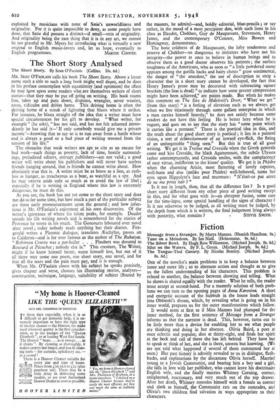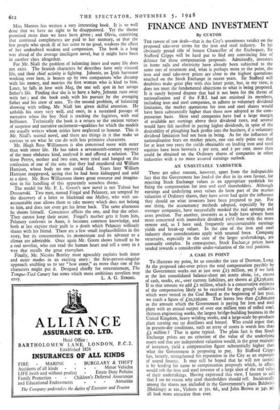Fiction
8s. 6d.)
ONE of the novelist's main problems is to keep a balance between inner and outer life ; so to alternate action and thought as to give us the fullest understanding of his 'characters. This problem is related to another, the balance between showing and telling. What he 'shows is shared equally with the reader. What he tells, the reader must accept at second-hand. For a masterly solution of both prob- lems we can turn to the opening pages of Anna Karenina. A short and energetic account of the hubbub in the house leads straight into Oblonski's dream, which, by revealing what is going on in his inner world, prepares us for the outer manifestations which follow.
It would seem at first as if Miss Marines had plumped for the inner method, for the first sentence of '411eisage from a Stranger informs us that the narrator is dead. This, however, turns out to be little more than a device for enabling her to see what people are thinking and doing in her absence. Olivia Baird, a poet at once eclectic and popular, dies at thirty-eight, and finds her spirit at the beck and call of those she has left behind. They have but to speak or think of her, and she is there, unseen but knowing. (We are not told what happened if several of them summoned her at once.) Her past history is adroitly revealed to us in dialogue, flash- backs, and explanations by the discamate Olivia herself. Married young to a Jewish Communist, and bearing him a boy-and a girl, she falls in love with her publisher, who cannot leave his doctrinaire English wife, and she finally marries Whitney Corning, correct, enlightened, reactionary, and very much out of the top drawer. After her death, Whitney consoles himself with a female as correct and sleek as himself, the Communist rats on the comrades, and Olivia's two children find salvation in ways appropriate to their characters.
Miss Marines has written a very interesting book. It is so well done that we have no right to be disappointed. Yet the theme promised more than we have been given ; and Olivia, contriving that continual compliments are paid to her memory, or that the few people who speak ill of her come to no good, weakens the effect of her undoubted wisdom and compassion. The book is a long way ahead of the average intelligent novel, but it might have been in another class altogether.
For Mr. Niall the problem of balancing inner and outer life does not exist. The brutish characters he- describes have • only visceral life, and their chief activity is fighting. Johnnie, an Irish harvester working over here, is beaten up by two companions 'who decamp with his money, and marries the first woman who, is kind to him. Later, he falls in love with Meg, the one soft spot in her savage father's life. Finding that she is to have a baby, Johnnie runs away with her ; and the book ends with his pursuit by the avenging father and his crew of sons. To the second problem, of balancing showing with telling, Mr. Niall has given skilful attention. He unfolds his story very well, and once, in a sustained passage of narrative when the boy Ned is tracking the fugitives, with real brilliance. Technically the book is a return to the ancient virtues of suspense and narrative excitement—qualities for which the models are usually writers whom critics have neglected to honour. This is Mr. Niall's second novel, and there are things in it that make us curious to see what he can do with less primitive characters.
Mr. Hugh Ross Williamson is also concerned more with outer than with inner life. He has taken a seventeenth-century mystery of the most obdurate kind, analysed it and offered a solution. The three Perrys, mother and two sons, were tried and hanged on the confession of one of the sons that they had murdered old William Harrison, whose body no one could find. Years later William Harrison reappeared, saying that he had been kidnapped and sold as a slave. Mr. Ross Williamson shows great resource and imagina- tion in his handling of this apparently senseless theme.
The model for Mr. F. L. Green's new novel is not Tolstoi but Dostoevski. Two men, named Fingal and Pelancey, are tempted by the discovery of a letter to blackmail one Malloy, who with un- accountable ease allows them to take money which does not belong to him, and does not even get his letter back. The same afternoon he shoots himself. Conscience afflicts the one, and fear the other. They cannot keep their secret. Fingal's mother gets it from him, Pelancey confesses to Anne, it becomes common knowledge, and both at last expiate their guilt in a death which Pelancey willingly shares with his friend. There are a few small implausibilities in the story, but its concentration, its .momentum and its advance to a climax are admirable. Once again Mr. Green shows himself to be a real novelist, who can read the human heart and tell a story in a way that recalls the great exemplars.
Finally, Mr. Nicolas Bentley most agreeably exploits both inner and outer modes in an exciting story : the first-person-singular approach enabling us to see "how come," as more than one of his characters might put it. Designed chiefly for entertainment, The Tongue-Tied Canary has notes which more ambitious novelists may











































 Previous page
Previous page